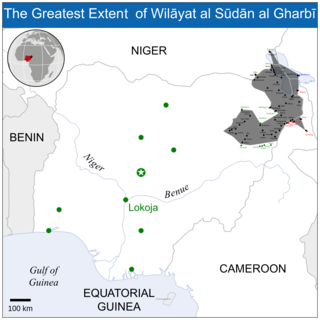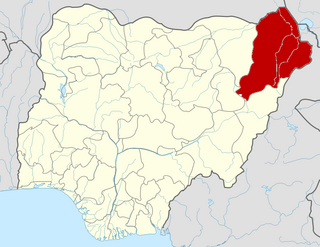Related Research Articles

Maiduguri is the capital and the largest city of Borno State in north-eastern Nigeria, on the continent of Africa. The city sits along the seasonal Ngadda River which disappears into the Firki swamps in the areas around Lake Chad. Maiduguri was founded in 1907 as a military outpost by the British Empire during the colonial period. As of 2022, Maiduguri is estimated to have a population of approximately two million people, in the metropolitan area.

Goodluck Ebele Azikiwe Jonathan is a Nigerian politician who served as the president of Nigeria from 2010 to 2015. He lost the 2015 presidential election to former military head of state General Muhammadu Buhari and was the first incumbent president in Nigerian history to concede defeat in an election, thus allowing for a peaceful transition of power.

Boko Haram, officially known as Jamā'at Ahl as-Sunnah lid-Da'wah wa'l-Jihād, is a self-proclaimed jihadist militant group based in northeastern Nigeria, which is also active in Chad, Niger, northern Cameroon, and Mali. In 2016, the group split, resulting in the emergence of a hostile faction known as the Islamic State's West Africa Province. Muslim scholars generally oppose both groups.

Gwoza is a local government area of Borno State, Nigeria. Its headquarters are in the town of Gwoza, a border town "about 135 kilometres South-East of Maiduguri." The postal code of the area is 610.
Fotokol is a town and commune in Logone-et-Chari Department, Far North Region, Cameroon. It is home to Fotokol High School.

The Boko Haram insurgency began in July 2009, when the militant Islamist and jihadist rebel group Boko Haram started an armed rebellion against the government of Nigeria. The conflict is taking place within the context of long-standing issues of religious violence between Nigeria's Muslim and Christian communities, and the insurgents' ultimate aim is to establish an Islamic state in the region.

Abubakar Mohammed Shekau was a Nigerian militant who was the leader of Boko Haram, an Islamist extremist organization based in northeastern Nigeria, from 2009 to 2021. He served as deputy leader to the group's founder, Mohammed Yusuf, until Yusuf's execution in 2009.
Timeline of the Boko Haram insurgency is the chronology of the Boko Haram insurgency, an ongoing armed conflict between Nigerian Islamist group Boko Haram and the Nigerian government. Boko Haram have carried out many attacks against the military, police and civilians since 2009, mostly in Nigeria. The low-intensity conflict is centred on Borno State. It peaked in the mid-2010s, when Boko Haram extended their insurgency into Cameroon, Chad and Niger.
The Konduga massacre took place in Konduga, Borno State, Nigeria on 11 February 2014. The massacre was conducted by Boko Haram Islamists against Christian villagers. At least 62 people were killed.

On the night of 14–15 April 2014, 276 mostly Christian female students and also Muslim students aged from 16 to 18 were kidnapped by the Islamic terrorist group called Boko Haram from the Government Girls Secondary School at the town of Chibok in Borno State, Nigeria. Prior to the raid, the school had been closed for four weeks due to deteriorating security conditions, but the girls were in attendance in order to take final exams in physics.

On the evening of 1 June 2014, an improvised explosive device was set off at a football field in Mubi, Adamawa State, Nigeria. At least 40 people were killed in the attack, according to eyewitnesses. Nineteen others were injured. The perpetrators of the attack were not clear, although media reports generally blamed Boko Haram.
From 20 to 23 June 2014, a series of attacks occurred in Borno State, Nigeria. 91 women and children were kidnapped in the attacks and more than 70 people were killed.

Between 23 and 25 June 2014, a series of attacks occurred in central Nigeria. On 23–24 June, gunmen attacked a number of villages in Kaduna State, killing around 150 people. The attack was blamed on Fulani tribesmen. On 25 June 2014, a bomb exploded at the Emab Plaza in the national capital of Abuja, killing at least 21 people. In response to the bombing, the Nigerian military raided two militants camps on 26 June, killing more than 100 people.

Religious violence in Nigeria refers to Christian-Muslim strife in modern Nigeria, which can be traced back to 1953. Today, religious violence in Nigeria is dominated by the Boko Haram insurgency, which aims to establish an Islamic state in Nigeria. Since the turn of the 21st century, 62,000 Nigerian Christians have been killed by the terrorist group Boko Haram, Fulani herdsmen and other groups. The killings have been referred to as a silent genocide.
The following lists events from 2014 in Nigeria.
The 2015 Baga massacre was a series of mass killings carried out by the Boko Haram terrorist group in the north-eastern Nigerian town of Baga and its environs, in the state of Borno, between 3 January and 7 January 2015.

Starting in late January 2015, a coalition of West African troops launched an offensive against the Boko Haram insurgents in Nigeria.
The 2015 Chad suicide bombings were a suicide attack which occurred the afternoon of Saturday 10, October 2015 in the town of Baga Sola, Chad, a small fishing community on Lake Chad. The attack was allegedly perpetrated by the Nigeria-based Islamic extremist group Boko Haram and resulted in the deaths of around 36 individuals, and wounded upwards of 50 more. The attacks were reportedly carried out by two women, two children, and a man with the intended targets being a busy marketplace, and a nearby refugee camp hosting tens of thousands of Nigerians. It was the deadliest attack to take place in the Lake Chad region.
On 27 July 2019 a squad of Boko Haram terrorists opened fire on a group of people walking from a funeral in Nganzai District of Borno State, Nigeria. At least 65 people were killed in the attack and 10 injured people were hospitalized. The attack occurred as part of the Boko Haram insurgency.

During the afternoon of 9 June 2020, a massacre occurred in a village in Gubio Local Government Area of Borno State, northeastern Nigeria. A group of gunmen on motorcycles and other vehicles attacked the village for over two hours, killing at least 81 people. Thirteen other people were injured in the attack, and seven others abducted. The attackers also killed over 300 cows and stole another 1,000. An Air Force fighter jet fired shots at the insurgents as they left. The insurgents returned the following morning, killing a herdsman who escaped the massacre, then set fire to the village. No group claimed responsibility, but suspicion fell on the jihadist group Boko Haram.
References
- 1 2 3 4 5 "Boko Haram murder 24 at village funeral – mostly women". The Guardian . 2016-06-17. Archived from the original on 2022-12-09.
- 1 2 3 4 5 6 "Boko Haram kills 18 women at a funeral in Nigeria". Al Jazeera . Archived from the original on 2023-07-10.